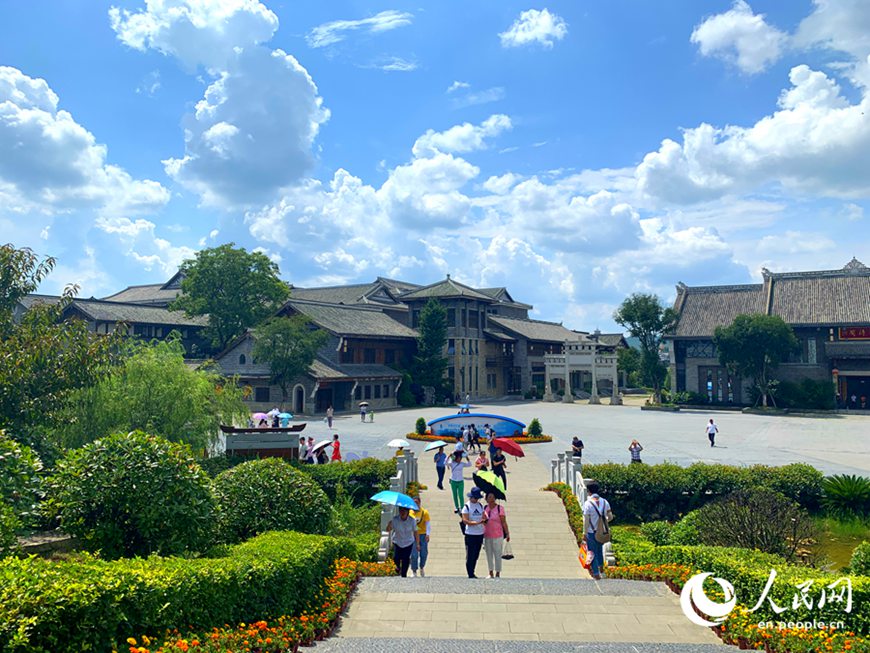

While the US is proud of its Silicon Valley, China has its Data Valley, located in the country's first national forest city, Guiyang. The capital city of southwest China's Guizhou Province, nestled among fantastic mountains and luscious green forests, has been gaining attention on the international stage since the founding of the People's Republic of China.
Since 2015, Guiyang has actively promoted the deep integration of big data and the real economy. Its advantages in geography, climate and operational costs have attracted numerous internet giants and large numbers of tech startups to develop some of the most cutting-edge technologies in the world.

Cutting-edge autonomous driving employs 3D printing, A.I. and big data
Pix Moving, a tech startup based in Guiyang, uses big data, artificial intelligence, and 3D printing to develop self-driving vehicles.
The autonomous chassis of the company's car is manufactured using 3D metal printing which makes it highly customizable. The company foresees smart cities filled with robo-vehicles, including pizza trucks, coffee cars, and even self-driving hotels, which could all become autonomously routed and free-moving parts of the city.
"Guiyang is just like a startup, it is full of people who are exploring and innovating," said Nancy Lee, marketing manager of PIX Moving.
“In the past 70 years, China has made tremendous achievements. We are now embracing the era of big data and AI technology,” said Yu Chuan, CEO of PIX Moving. “We hope that through our enterprises and applications, big data and AI can contribute to China’s future development,” he added.
As China's first big data pilot zone, Guiyang has actively promoted the deep integration of big data and the real economy since China's big data valley officially settled in the city in 2015. The city has held the China International Big Data Industry Expo for five successive years.
"Fully embracing emerging industries, Guiyang is constantly attracting young pioneers and entrepreneurs, which gives the city a vibe of vitality, energy and hope," Lee added.

Nancy Lee, marketing manager of PIX Moving, chats with reporter from People's Daily Online on July 28, 2019. (Photo/Liu Ning)
According to the "Best-Performing Cities China" report published by the Milken Institute, in 2018, Guiyang ranked fifth among first-tier cities.
In June 2015, Chinese President Xi Jinping noted, "It makes sense to develop big data in Guizhou", and requested Guizhou to maintain development and protection of the ecosystem, strive to catch up, and find a new development path that is different from the other regions of China.
Guiyang has attracted a large number of internet giants, including Qualcomm, Huawei, Tencent, Alibaba and Apple, to establish cloud computing and big data centers.
The main business revenue of big data enterprises in Guiyang reached 100 billion yuan in 2018, an increase of 22.4 percent from the previous year. There are 51 new big data companies, bringing the total number to 208. Telecommunications services reached 45.7 billion yuan, increasing 137.8 percent year-on-year.
Integrated development of big data and agriculture
The development of big data has also helped drive the industrial upgrading of rural areas. Xiuwen county, which is located north of Guiyang and had been trapped in poverty in the past, has now become widely known for its kiwi fruit.
The county has set up an agricultural big data Internet of Things (IoT) platform to complete the construction of kiwi plantation data collection systems, which enable farmers to track every step of the production process online.
With an investment of 50 million yuan, the county has independently developed an IoT cloud platform, recording 495 kiwi growers in the county, including the necessary information of the orchard, fertilization, growth records, picking records and two-dimensional codes of produce.
Moreover, a corresponding app can also be downloaded by farmers to supervise the kiwi orchard, which can significantly increase efficiency.
"Previously, we needed a lot of people to look after this kiwi orchard, but in 2015, the government installed big data monitoring for us, which included reminding us to water and fertilize the orchard. Now we can control this kiwi orchard from home," said Huang Lianghua, the owner of a kiwi orchard in Xiuwen County.

Huang Lianghua checks kiwis in his orchard in Xiuwen County on July 31, 2019. (Photo/ Liu Ning)
Thanks to these efforts, demand for the county's kiwi fruit has grown both domestically and overseas. Huang’s kiwi fruit are now exported to Japan, Singapore, Thailand and Malaysia, granting him an annual income of roughly 600,000 yuan.
“The development of technology brings great benefits and convenience to us,” Huang said. “We hope the big data system can be applied to more farmers, and bring benefits to all farmers,” he added.
Integration of big data into modern industries
During the 9th Provincial Tourism Conference in 2014, the first phase of a "smart tourism" project in Qingyan Ancient Town was implemented, including the construction of Wi-Fi coverage, video monitoring systems, an electronic ticketing system, and intelligent parking.
In 2016, the scenic spot had improved the coverage of free Wi-Fi and intelligent voice explanation (scanning a QR code via Wechat to get free voice explanation).
Additionally, the scenic spot has established cooperation with many well-known online platforms, such as Meituan, TravelGo, Ctrip and Qunar to further improve the tourist experience.

Tourists walk in Qingyan Ancient Town, a southern suburb of Guiyang City, southwest China's Guizhou Province, July 30, 2019. The spot is home to smart technologies including wifi coverage, video monitoring, electronic ticketing and intelligent parking. (Photo/ZhaoTong)
Guizhou has implemented the "integration of all industries" action plan in 2018, to construct "Digital Guizhou" and deepen the innovative integration of cloud computing, quantum communication, artificial intelligence, big data, and other new-generation information technologies into the real economy.
Entrepreneurs see the change and also the prospect of Guiyang, with opportunities to cooperate with the city's big data technology. Touchworks Optoelectronics is a company which focuses on the research, development, and sale of the capacitive touch panel (1-100 inches).
Chen Hongyu, Chief Technology Officer of Touchworks, said, "I came to Guiyang for the first time in 2012. In just seven years, I think Guiyang has changed a lot, especially in the high-tech zone, which includes the settlement of many high-tech enterprises and the planning of the science city."
By the end of this year, this company will cooperate with Guiyang high-tech enterprises to apply big data to the equipment, which is in line with the current industry 4.0.
"It feels like Silicon Valley in the United States and Neihu Technology Park in China's Taiwan," added Chen.
Big data has become a powerful engine leading the digital economy and promoting the high-quality development of the social economy. It has also become a beautiful new business card to introduce Guizhou to the world.
"Through the development of big data and the integrated application of big data in recent years, it has laid a solid foundation for Guiyang to carry out high-level opening-up and high-quality development in the future," said Li Xiang, Deputy Director of Guiyang Municipal Bureau of Big Data Development Administration.
"Big data is an important lever for Guiyang's economic restructuring, transformation and upgrading," added Li.

 Award-winning photos show poverty reduction achievements in NE China's Jilin province
Award-winning photos show poverty reduction achievements in NE China's Jilin province People dance to greet advent of New Year in Ameiqituo Town, Guizhou
People dance to greet advent of New Year in Ameiqituo Town, Guizhou Fire brigade in Shanghai holds group wedding
Fire brigade in Shanghai holds group wedding Tourists enjoy ice sculptures in Datan Town, north China
Tourists enjoy ice sculptures in Datan Town, north China Sunset scenery of Dayan Pagoda in Xi'an
Sunset scenery of Dayan Pagoda in Xi'an Tourists have fun at scenic spot in Nanlong Town, NW China
Tourists have fun at scenic spot in Nanlong Town, NW China Harbin attracts tourists by making best use of ice in winter
Harbin attracts tourists by making best use of ice in winter In pics: FIS Alpine Ski Women's World Cup Slalom
In pics: FIS Alpine Ski Women's World Cup Slalom Black-necked cranes rest at reservoir in Lhunzhub County, Lhasa
Black-necked cranes rest at reservoir in Lhunzhub County, Lhasa China's FAST telescope will be available to foreign scientists in April
China's FAST telescope will be available to foreign scientists in April